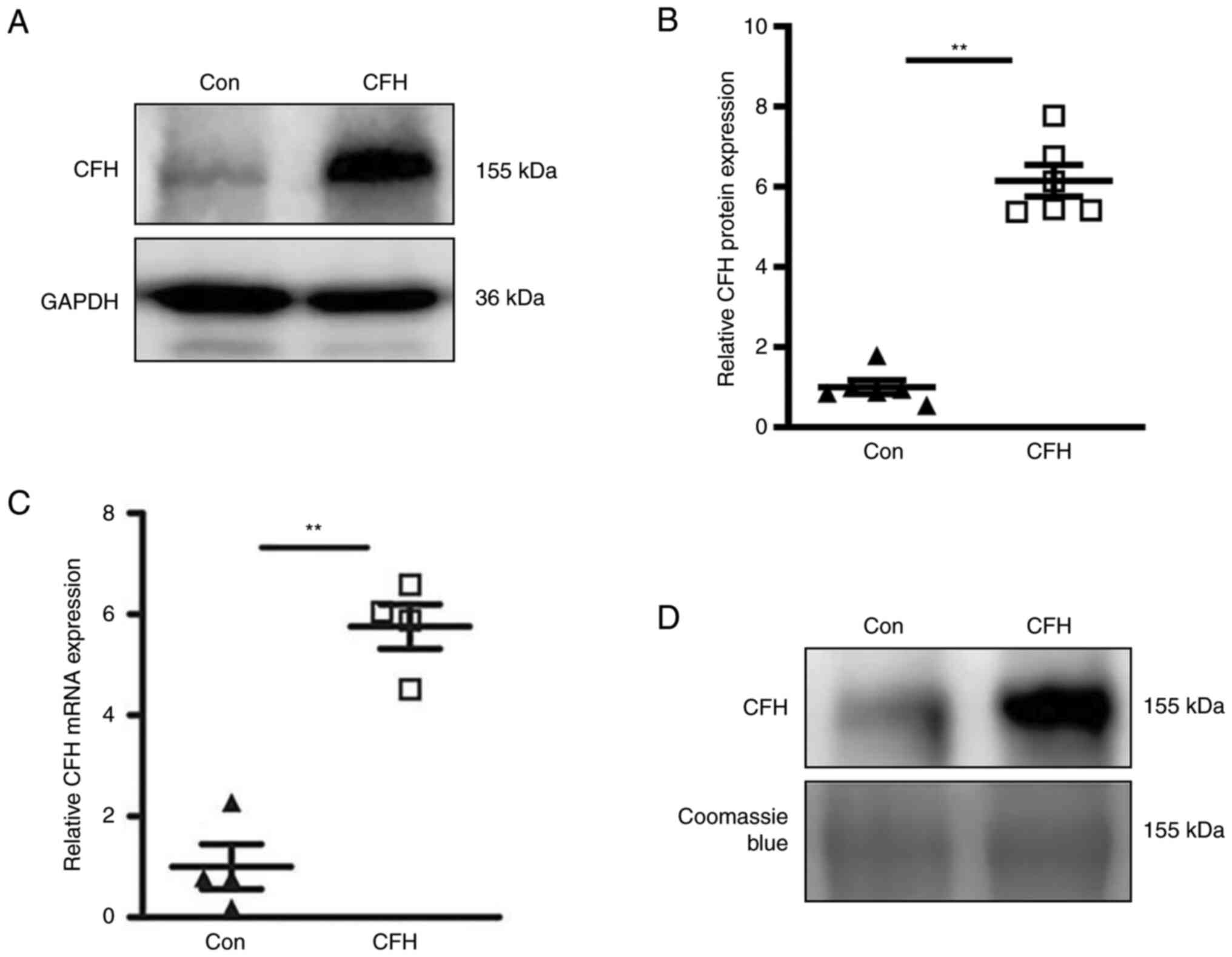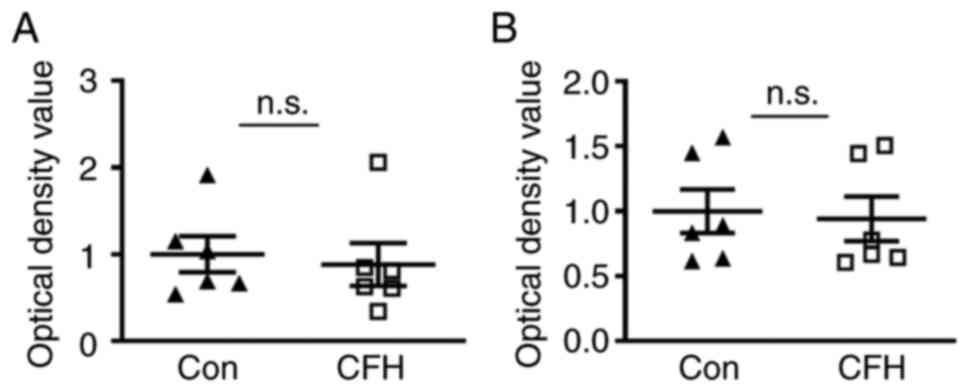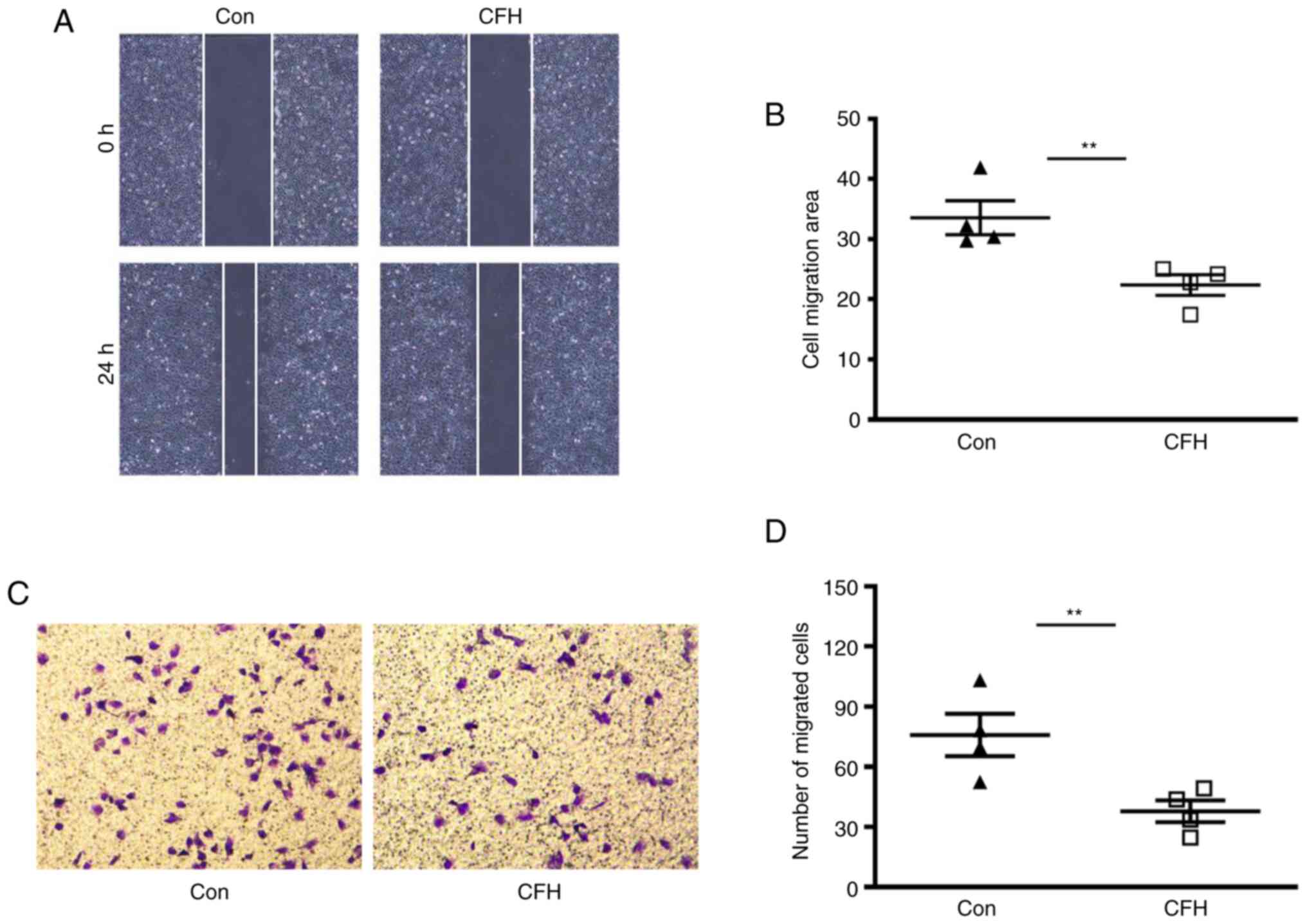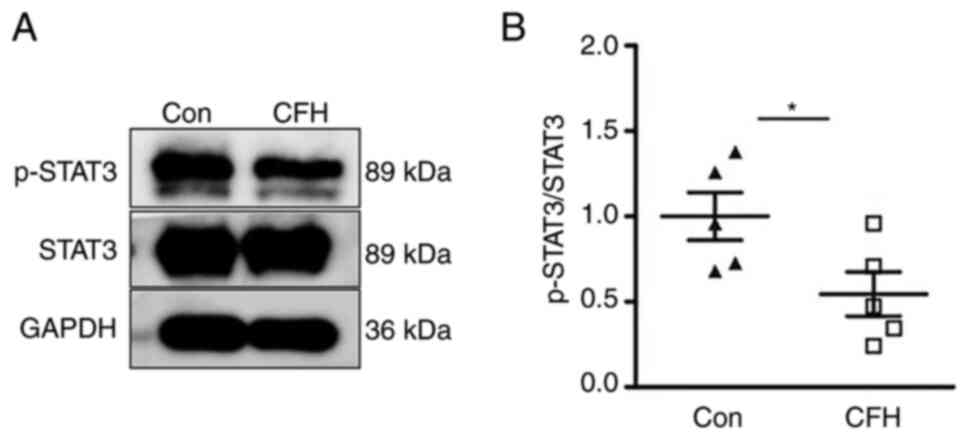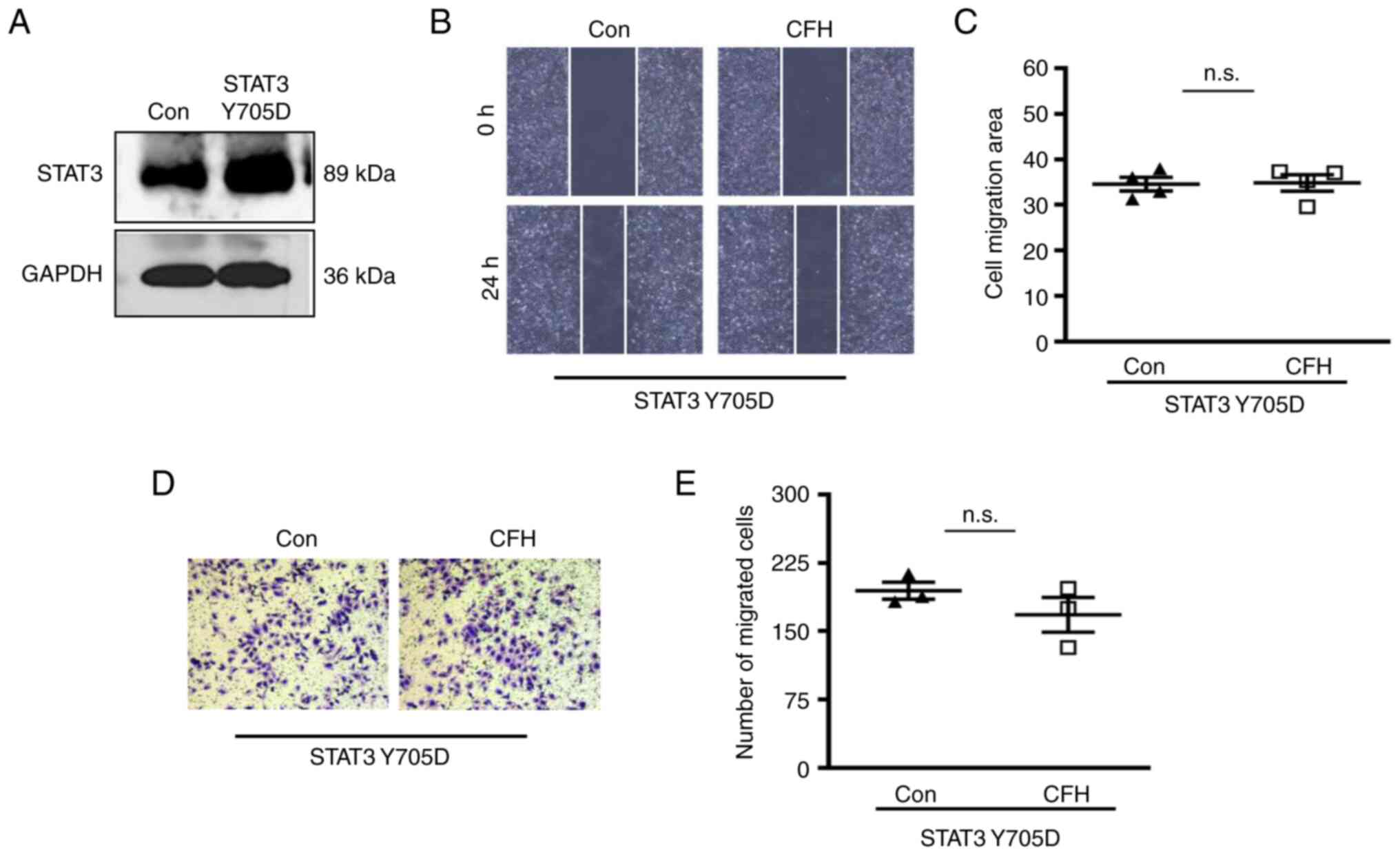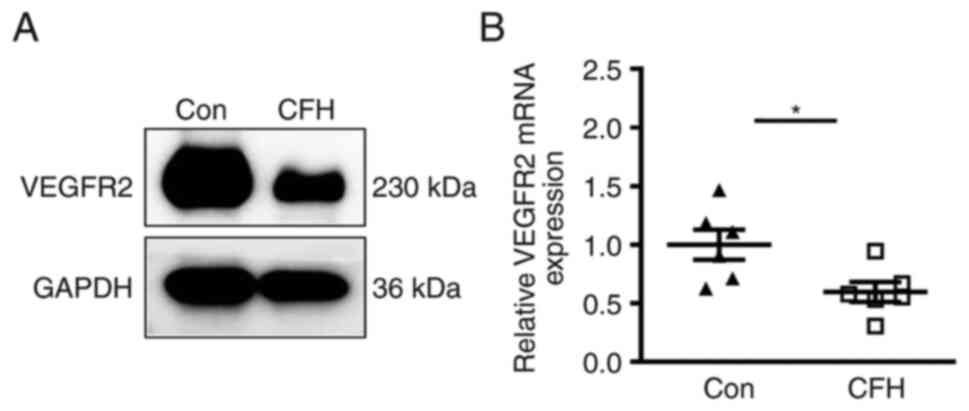|
1
|
Grant ZL, Whitehead L, Wong VH, He Z, Yan
RY, Miles AR, Benest AV, Bates DO, Prahst C, Bentley K, et al:
Blocking endothelial apoptosis revascularizes the retina in a model
of ischemic retinopathy. J Clin Invest. 130:4235–4251.
2020.PubMed/NCBI View Article : Google Scholar
|
|
2
|
Dahham SS, Tabana Y, Asif M, Ahmed M, Babu
D, Hassan LE, Ahamed MBK, Sandai D, Barakat K, Siraki A and Majid
AMSA: β-Caryophyllene induces apoptosis and inhibits angiogenesis
in colorectal cancer models. Int J Mol Sci.
22(10550)2021.PubMed/NCBI View Article : Google Scholar
|
|
3
|
Unterleuthner D, Neuhold P, Schwarz K,
Janker L, Neuditschko B, Nivarthi H, Crncec I, Kramer N, Unger C,
Hengstschläger M, et al: Cancer-associated fibroblast-derived WNT2
increases tumor angiogenesis in colon cancer. Angiogenesis.
23:159–177. 2020.PubMed/NCBI View Article : Google Scholar
|
|
4
|
Wang X, Abraham S, McKenzie JAG, Jeffs N,
Swire M, Tripathi VB, Luhmann UFO, Lange CAK, Zhai Z, Arthur HM, et
al: LRG1 promotes angiogenesis by modulating endothelial TGF-β
signalling. Nature. 499:306–311. 2013.PubMed/NCBI View Article : Google Scholar
|
|
5
|
Bell CL, Vandenberghe LH, Bell P, Limberis
MP, Gao GP, Van Vliet K, Agbandje-McKenna M and Wilson JM: The AAV9
receptor and its modification to improve in vivo lung gene transfer
in mice. J Clin Invest. 121:2427–2435. 2011.PubMed/NCBI View
Article : Google Scholar
|
|
6
|
Gao P, Wang LL, Liu J, Dong F, Song W,
Liao L, Wang B, Zhang W, Zhou X, Xie Q, et al: Dihydroartemisinin
inhibits endothelial cell tube formation by suppression of the
STAT3 signaling pathway. Life Sci. 242(117221)2020.PubMed/NCBI View Article : Google Scholar
|
|
7
|
Li L, Dong F, Xu D, Du L, Yan S, Hu H,
Lobe CG, Yi F, Kapron CM and Liu J: Short-term, low-dose cadmium
exposure induces hyperpermeability in human renal glomerular
endothelial cells. J Appl Toxicol. 36:257–265. 2016.PubMed/NCBI View
Article : Google Scholar
|
|
8
|
Yang X, Song W, Zhang K, Wang Y, Chen F,
Chen Y, Huang T, Jiang Y, Wang X and Zhang C: p38 mediates T-2
toxin-induced Leydig cell testosterone synthesis disorder.
Ecotoxicol Environ Saf. 253(114695)2023.PubMed/NCBI View Article : Google Scholar
|
|
9
|
Mao X, Zhou L, Tey SK, Ma APY, Yeung CLS,
Ng TH, Wong SWK, Liu BHM, Fung YME, Patz EF Jr, et al: Tumour
extracellular vesicle-derived complement factor H promotes
tumorigenesis and metastasis by inhibiting complement-dependent
cytotoxicity of tumour cells. J Extracell Vesicles.
10(e12031)2020.PubMed/NCBI View Article : Google Scholar
|
|
10
|
Esparza-Gordillo J, Soria JM, Buil A,
Almasy L, Blangero J, Fontcuberta J and Rodríguez de Córdoba S:
Genetic and environmental factors influencing the human factor H
plasma levels. Immunogenetics. 56:77–82. 2004.PubMed/NCBI View Article : Google Scholar
|
|
11
|
Klein RJ, Zeiss C, Chew EY, Tsai JY,
Sackler RS, Haynes C, Henning AK, SanGiovanni JP, Mane SM, Mayne
ST, et al: Complement factor H polymorphism in age-related macular
degeneration. Science. 308:385–389. 2005.PubMed/NCBI View Article : Google Scholar
|
|
12
|
Kim SJ, Kim J, Lee J, Cho SY, Kang HJ, Kim
KY and Jin DK: Intravitreal human complement factor H in a rat
model of laser-induced choroidal neovascularisation. Br J
Ophthalmol. 97:367–370. 2013.PubMed/NCBI View Article : Google Scholar
|
|
13
|
Liu J and Hoh J: Loss of complement factor
H in plasma increases endothelial cell migration. J Cancer.
8:2184–2190. 2017.PubMed/NCBI View Article : Google Scholar
|
|
14
|
Zhang Y, Huang Q, Tang M, Zhang J and Fan
W: Complement factor H expressed by retinal pigment epithelium
cells can suppress neovascularization of human umbilical vein
endothelial cells: An in vitro study. PLoS One.
10(e0129945)2015.PubMed/NCBI View Article : Google Scholar
|
|
15
|
Hu Z, Han Y, Liu Y, Zhao Z, Ma F, Cui A,
Zhang F, Liu Z, Xue Y, Bai J, et al: CREBZF as a key regulator of
STAT3 pathway in the control of liver regeneration in mice.
Hepatology. 71:1421–1436. 2020.PubMed/NCBI View Article : Google Scholar
|
|
16
|
Yahata Y, Shirakata Y, Tokumaru S,
Yamasaki K, Sayama K, Hanakawa Y, Detmar M and Hashimoto K: Nuclear
translocation of phosphorylated STAT3 is essential for vascular
endothelial growth factor-induced human dermal microvascular
endothelial cell migration and tube formation. J Biol Chem.
278:40026–40031. 2003.PubMed/NCBI View Article : Google Scholar
|
|
17
|
Zhang M, Zhou L, Xu Y, Yang M, Xu Y,
Komaniecki GP, Kosciuk T, Chen X, Lu X, Zou X, et al: A STAT3
palmitoylation cycle promotes TH17 differentiation and
colitis. Nature. 586:434–439. 2020.PubMed/NCBI View Article : Google Scholar
|
|
18
|
Shen Y, Wang X, Liu Y, Singhal M,
Gürkaşlar C, Valls AF, Lei Y, Hu W, Schermann G, Adler H, et al:
STAT3-YAP/TAZ signaling in endothelial cells promotes tumor
angiogenesis. Sci Signal. 14(eabj8393)2021.PubMed/NCBI View Article : Google Scholar
|
|
19
|
Song D, Lan J, Chen Y, Liu A, Wu Q, Zhao
C, Feng Y, Wang J, Luo X, Cao Z, et al: NSD2 promotes tumor
angiogenesis through methylating and activating STAT3 protein.
Oncogene. 40:2952–2967. 2021.PubMed/NCBI View Article : Google Scholar
|
|
20
|
Huang J, Tang L, Zhao Y and Ding W: TRIM11
promotes tumor angiogenesis via activation of STAT3/VEGFA signaling
in lung adenocarcinoma. Am J Cancer Res. 9:2019–2027.
2019.PubMed/NCBI
|
|
21
|
Xia Z, Xiao J, Dai Z and Chen Q: Membrane
progesterone receptor α (mPRα) enhances hypoxia-induced vascular
endothelial growth factor secretion and angiogenesis in lung
adenocarcinoma through STAT3 signaling. J Transl Med.
20(72)2022.PubMed/NCBI View Article : Google Scholar
|
|
22
|
Xu G, Zhu L, Wang Y, Shi Y, Gong A and Wu
C: Stattic enhances radiosensitivity and reduces radio-induced
migration and invasion in HCC cell lines through an apoptosis
pathway. Biomed Res Int. 2017(1832494)2017.PubMed/NCBI View Article : Google Scholar
|
|
23
|
Cao L, Ren Y, Guo X, Wang L, Zhang Q, Li
X, Wu X, Meng Z and Xu K: Downregulation of SETD7 promotes
migration and invasion of lung cancer cells via JAK2/STAT3 pathway.
Int J Mol Med. 45:1616–1626. 2020.PubMed/NCBI View Article : Google Scholar
|
|
24
|
Xie TX, Wei D, Liu M, Gao AC, Ali-Osman F,
Sawaya R and Huang S: Stat3 activation regulates the expression of
matrix metalloproteinase-2 and tumor invasion and metastasis.
Oncogene. 23:3550–3560. 2004.PubMed/NCBI View Article : Google Scholar
|
|
25
|
Chen J and Wang Y, Wang S, Zhao X, Zhao L
and Wang Y: Salvianolic acid B and ferulic acid synergistically
promote angiogenesis in HUVECs and zebrafish via regulating VEGF
signaling. J Ethnopharmacol. 283(114667)2022.PubMed/NCBI View Article : Google Scholar
|
|
26
|
Porter AM, Klinge CM and Gobin AS:
Biomimetic hydrogels with VEGF induce angiogenic processes in both
hUVEC and hMEC. Biomacromolecules. 12:242–246. 2011.PubMed/NCBI View Article : Google Scholar
|
|
27
|
Cerezo AB, Hornedo-Ortega R,
Alvarez-Fernandez MA, Troncoso AM and Garcia-Parrilla MC:
Inhibition of VEGF-induced VEGFR-2 activation and HUVEC migration
by melatonin and other bioactive indolic compounds. Nutrients.
9(248)2017.PubMed/NCBI View Article : Google Scholar
|
|
28
|
Mac Gabhann F and Popel AS: Dimerization
of VEGF receptors and implications for signal transduction: A
computational study. Biophys Chem. 128:125–139. 2007.PubMed/NCBI View Article : Google Scholar
|
|
29
|
Rezzola S, Di Somma M, Corsini M, Leali D,
Ravelli C, Polli VAB, Grillo E, Presta M and Mitola S: VEGFR2
activation mediates the pro-angiogenic activity of BMP4.
Angiogenesis. 22:521–533. 2019.PubMed/NCBI View Article : Google Scholar
|
|
30
|
Melincovici CS, Boşca AB, Şuşman S,
Mărginean M, Mihu C, Istrate M, Moldovan IM, Roman AL and Mihu CM:
Vascular endothelial growth factor (VEGF)-key factor in normal and
pathological angiogenesis. Rom J Morphol Embryol. 59:455–467.
2018.PubMed/NCBI
|
|
31
|
Nagarkoti S, Kim YM, Ash D, Das A, Vitriol
E, Read TA, Youn SW, Sudhahar V, McMenamin M, Hou Y, et al: Protein
disulfide isomerase A1 as a novel redox sensor in VEGFR2 signaling
and angiogenesis. Angiogenesis. 26:77–96. 2023.PubMed/NCBI View Article : Google Scholar
|
|
32
|
Zou S, Gao Y and Zhang S: lncRNA HCP5 acts
as a ceRNA to regulate EZH2 by sponging miR-138-5p in cutaneous
squamous cell carcinoma. Int J Oncol. 59(56)2021.PubMed/NCBI View Article : Google Scholar
|
|
33
|
Zhao M, Hu X, Xu Y, Wu C, Chen J, Ren Y,
Kong L, Sun S, Zhang L, Jin R and Zhou X: Targeting of EZH2
inhibits epithelial-mesenchymal transition in head and neck
squamous cell carcinoma via regulating the STAT3/VEGFR2 axis. Int J
Oncol. 55:1165–1175. 2019.PubMed/NCBI View Article : Google Scholar
|
|
34
|
Lee HT, Xue J, Chou PC, Zhou A, Yang P,
Conrad CA, Aldape KD, Priebe W, Patterson C, Sawaya R, et al: Stat3
orchestrates interaction between endothelial and tumor cells and
inhibition of Stat3 suppresses brain metastasis of breast cancer
cells. Oncotarget. 6:10016–10029. 2015.PubMed/NCBI View Article : Google Scholar
|
|
35
|
Zhang F, Hu G, Chen X, Zhang L, Guo L, Li
C, Zhao H, Cui Z, Guo X, Sun F, et al: Excessive branched-chain
amino acid accumulation restricts mesenchymal stem cell-based
therapy efficacy in myocardial infarction. Signal Transduct Target
Ther. 7(171)2022.PubMed/NCBI View Article : Google Scholar
|
|
36
|
Livak KJ and Schmittgen TD: Analysis of
relative gene expression data using real-time quantitative PCR and
the 2(-Delta Delta C(T)) method. Methods. 25:402–408.
2001.PubMed/NCBI View Article : Google Scholar
|
|
37
|
Zhu T, Yao Q, Hu X, Chen C, Yao H and Chao
J: The role of MCPIP1 in ischemia/reperfusion injury-induced HUVEC
migration and apoptosis. Cell Physiol Biochem. 37:577–591.
2015.PubMed/NCBI View Article : Google Scholar
|
|
38
|
Chen W, He S and Xiang D: Hypoxia-induced
retinal pigment epithelium cell-derived bFGF promotes the migration
and angiogenesis of HUVECs through regulating TGF-β1/smad2/3
pathway. Gene. 790(145695)2021.PubMed/NCBI View Article : Google Scholar
|
|
39
|
Schust J, Sperl B, Hollis A, Mayer TU and
Berg T: Stattic: A small-molecule inhibitor of STAT3 activation and
dimerization. Chem Biol. 13:1235–1242. 2006.PubMed/NCBI View Article : Google Scholar
|
|
40
|
Lyzogubov VV, Tytarenko RG, Jha P, Liu J,
Bora NS and Bora PS: Role of ocular complement factor H in a murine
model of choroidal neovascularization. Am J Pathol. 177:1870–1880.
2010.PubMed/NCBI View Article : Google Scholar
|
|
41
|
Rohrer B, Long Q, Coughlin B, Wilson RB,
Huang Y, Qiao F, Tang PH, Kunchithapautham K, Gilkeson GS and
Tomlinson S: A targeted inhibitor of the alternative complement
pathway reduces angiogenesis in a mouse model of age-related
macular degeneration. Invest Ophthalmol Vis Sci. 50:3056–3064.
2009.PubMed/NCBI View Article : Google Scholar
|
|
42
|
Borras C, Delaunay K, Slaoui Y, Abache T,
Jorieux S, Naud MC, Sanharawi ME, Gelize E, Lassiaz P, An N, et al:
Mechanisms of FH protection against neovascular AMD. Front Immunol.
11(443)2020.PubMed/NCBI View Article : Google Scholar
|
|
43
|
Moore SR, Menon SS, Cortes C and Ferreira
VP: Hijacking factor H for complement immune evasion. Front
Immunol. 12(602277)2021.PubMed/NCBI View Article : Google Scholar
|
|
44
|
Siamwala JH, Reddy SH, Majumder S, Kolluru
GK, Muley A, Sinha S and Chatterjee S: Simulated microgravity
perturbs actin polymerization to promote nitric oxide-associated
migration in human immortalized Eahy926 cells. Protoplasma.
242:3–12. 2010.PubMed/NCBI View Article : Google Scholar
|
|
45
|
Valanti EK, Dalakoura-Karagkouni K,
Fotakis P, Vafiadaki E, Mantzoros CS, Chroni A, Zannis V, Kardassis
D and Sanoudou D: Reconstituted HDL-apoE3 promotes endothelial cell
migration through ID1 and its downstream kinases ERK1/2, AKT and
p38 MAPK. Metabolism. 127(154954)2022.PubMed/NCBI View Article : Google Scholar
|
|
46
|
Bora NS, Kaliappan S, Jha P, Xu Q, Sohn
JH, Dhaulakhandi DB, Kaplan HJ and Bora PS: Complement activation
via alternative pathway is critical in the development of
laser-induced choroidal neovascularization: role of factor B and
facto H. J Immunol. 177:1872–1878. 2006.PubMed/NCBI View Article : Google Scholar
|
|
47
|
Goumans MJ, Valdimarsdottir G, Itoh S,
Lebrin F, Larsson J, Mummery C, Karlsson S and ten Dijke P: Activin
receptor-like kinase (ALK)1 is an antagonistic mediator of lateral
TGFbeta/ALK5 signaling. Mol Cell. 12:817–828. 2003.PubMed/NCBI View Article : Google Scholar
|
|
48
|
Min TR, Park HJ, Park MN, Kim B and Park
SH: The root bark of Morus alba L. Suppressed the migration of
human non-small-cell lung cancer cells through inhibition of
epithelial-mesenchymal transition mediated by STAT3 and Src. Int J
Mol Sci. 20(2244)2019.PubMed/NCBI View Article : Google Scholar
|
|
49
|
Coleman DR IV, Ren Z, Mandal PK, Cameron
AG, Dyer GA, Muranjan S, Campbell M, Chen X and McMurray JS:
Investigation of the binding determinants of phosphopeptides
targeted to the SRC homology 2 domain of the signal transducer and
activator of transcription 3. Development of a high-affinity
peptide inhibitor. J Med Chem. 48:6661–6670. 2005.PubMed/NCBI View Article : Google Scholar
|
|
50
|
Jin J, Yuan F, Shen MQ, Feng YF and He QL:
Vascular endothelial growth factor regulates primate
choroid-retinal endothelial cell proliferation and tube formation
through PI3K/Akt and MEK/ERK dependent signaling. Mol Cell Biochem.
381:267–272. 2013.PubMed/NCBI View Article : Google Scholar
|















